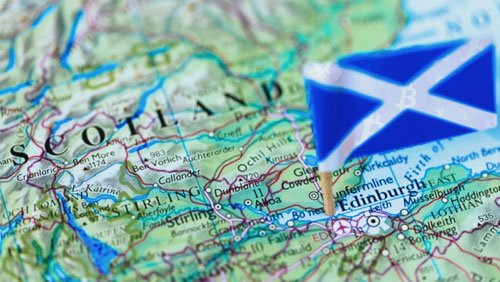There is a high chance that Scotland will soon push for a second independence referendum, following UK’s decision to leave the European Union.  This isn’t the first time the Scots have considered pushing for independence. In 2014, the Scottish independence referendum posed the question of whether Scotland should be an independent country. The “No” side won. And this, according to analysts, was partly due to the government’s inability to address currency issues had the referendum succeeded. In the interest of not making the same mistake, a Scottish think tank looked at ways how a national currency would work. According to Common Weal, Scotland—if it decides to launch a second independence campaign—should do it from “the standpoint of using independence to launch a new, independent Scottish currency,” which the Scottish think tank called “Pound-Scot.” Dr. Craig Dalzell, an M.Sci. and Ph.D. in laser physics and photonics, said that by tying the Scottish currency to the Sterling makes “the most sense,” since many voters would prefer a sense of continuity amid Scotland’s political upheaval of independence. Cryptoccurency is among the options for the new Scottish currency. According to the paper, digital currency “has been seen as attractive by those who wish to either remove the middle person involved in processing the transactions (i.e. the banks) or wish to remove the power and responsibility of creating new money from large, unaccountable corporations.” Of course there are concerns about the viability of virtual currencies, particularly in the lack of widespread acceptance. The paper also pointed out that asking people to rely on an unknown verification system could discourage them from using the currency, which, in turn, would undermine confidence and the value of money. “There are still technical challenges to the long term viability of cryptocurrencies which have not yet been readily addressed. At the moment, the time to process transactions made by cryptocurrencies is dependent on the total processing capacity of the miners and can take anywhere from seconds to hours,” according to the paper. No perfect solution Still, the paper doesn’t deny the fact that cryptocurrencies “should be considered seriously as a potential transaction medium.” Dalzell also stressed that technical challenges aside, there’s really no single option that is “particularly any riskier or less viable than any other.” “Economics is a dynamic event and no single currency option is likely to remain the optimal choice for an independent Scotland for all time,” the paper stated Current bitcoin price and daily transaction volume The price of the popular cryptocurrency dropped to $620.96 on Monday, with a market capitalization of more than $9.86 billion.
This isn’t the first time the Scots have considered pushing for independence. In 2014, the Scottish independence referendum posed the question of whether Scotland should be an independent country. The “No” side won. And this, according to analysts, was partly due to the government’s inability to address currency issues had the referendum succeeded. In the interest of not making the same mistake, a Scottish think tank looked at ways how a national currency would work. According to Common Weal, Scotland—if it decides to launch a second independence campaign—should do it from “the standpoint of using independence to launch a new, independent Scottish currency,” which the Scottish think tank called “Pound-Scot.” Dr. Craig Dalzell, an M.Sci. and Ph.D. in laser physics and photonics, said that by tying the Scottish currency to the Sterling makes “the most sense,” since many voters would prefer a sense of continuity amid Scotland’s political upheaval of independence. Cryptoccurency is among the options for the new Scottish currency. According to the paper, digital currency “has been seen as attractive by those who wish to either remove the middle person involved in processing the transactions (i.e. the banks) or wish to remove the power and responsibility of creating new money from large, unaccountable corporations.” Of course there are concerns about the viability of virtual currencies, particularly in the lack of widespread acceptance. The paper also pointed out that asking people to rely on an unknown verification system could discourage them from using the currency, which, in turn, would undermine confidence and the value of money. “There are still technical challenges to the long term viability of cryptocurrencies which have not yet been readily addressed. At the moment, the time to process transactions made by cryptocurrencies is dependent on the total processing capacity of the miners and can take anywhere from seconds to hours,” according to the paper. No perfect solution Still, the paper doesn’t deny the fact that cryptocurrencies “should be considered seriously as a potential transaction medium.” Dalzell also stressed that technical challenges aside, there’s really no single option that is “particularly any riskier or less viable than any other.” “Economics is a dynamic event and no single currency option is likely to remain the optimal choice for an independent Scotland for all time,” the paper stated Current bitcoin price and daily transaction volume The price of the popular cryptocurrency dropped to $620.96 on Monday, with a market capitalization of more than $9.86 billion.